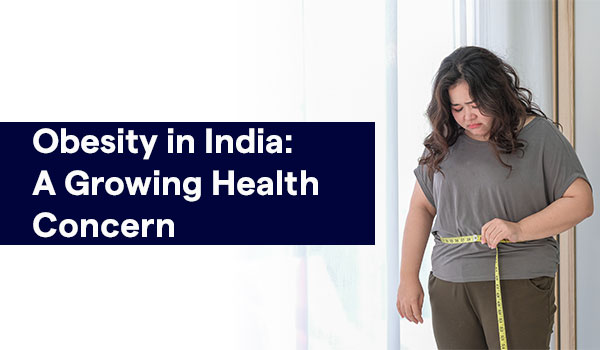
Over the past 10 years, India's obesity rate has almost tripled, impacting both the country's urban and rural populations. A global crisis of obesity is affecting people of all ages. According to a report, data indicates that obesity rates are high in India, coinciding with the nation's fast economic expansion and changing lifestyle standards. More than 100 million people in India struggle with obesity. It is observed that abdominal obesity is highly prevalent.
In India, 12% of men and 40% of women are abdominally obese. Kerala (65.4%), Tamil Nadu (57.9%), Punjab (62.5%), and Delhi (59%) all have high incidence rates. Madhya Pradesh (24.9%) and Jharkhand (23.9%) have low prevalence.
Excessive body fat accumulation is considered obesity, and metabolic risk is considerably affected by body fat distribution. Obese people typically have one of two body types, depending on where their fat is accumulated: gynecoid or pear-shaped, which is fat in the lower body (hips and thighs), or android or apple-shaped, which is fat in the upper body (visceral or abdominal obesity region). However, because it contributes people to a variety of metabolic problems and illnesses, abdominal or visceral obesity, most of the time referred to as central obesity, is thought to be the most severe form of fat distribution. India has also witnessed an increase in childhood obesity. The frequency of childhood obesity has significantly increased. A recent study conducted by the Indian Council of Medical Research (ICMR) reveals a concerning rise in pediatric obesity in India over the past decade.
According to statistics, there are already 14.4 million obese children in India. The primary causes of childhood obesity in India include poor dietary choices, inactivity, and a sedentary lifestyle. Children are consuming high-calorie, low-nutrient diets due to the growing popularity of processed snacks and fast food, which causes weight gain and obesity. The consequences of childhood obesity are extensive and impact children's health in the long run. Obese Children are at high risk of developing long-term health problems such as type 2 diabetes, hypertension, heart disease, and breathing difficulties. Additionally, they are more likely to experience mental health problems, including despair and poor self-esteem, which can worsen their general health.
India's obesity rates also significantly increased as a result of COVID-19. This rise in obesity is caused by several variables, such as alterations in lifestyle, restricted availability of healthful food selections, and decreased physical activity. A primary cause of the obesity surge during the COVID-19 was lifestyle changes. Due to lockdowns and other mobility restrictions, people have become confined to their houses, resulting in a sedentary lifestyle. The closing of leisure centers, parks, and gyms has led to decreased physical activity. Obesity and weight increase can be attributed to chronic inactivity and a lack of exercise.
The lack of availability of healthful dietary alternatives is another concern. The epidemic has caused interruptions in the food supply chain, which has resulted in a shortage of fresh produce, fruits, and other nutrient-dense foods. This has led to a rise in the consumption of unhealthy, high-calorie meals, panic shopping, and food stockpiling of manufactured and shelf-stable items. These foods contribute to weight gain and obesity because they are frequently heavy in sugar, bad fats, and salt.
In addition to endangering people, these health hazards burden the healthcare system. Addressing these repercussions and promoting healthy lifestyles is imperative to reducing the obesity rate in India.
To tackle obesity, to begin with, it is essential to encourage a nutritious diet. Efforts for nutrition education, educated food choices, and public awareness may help achieve this. Increasing physical exercise is also crucial. Regular exercise may be encouraged through corporate wellness programs, community-based programs, and the promotion of active transportation. Furthermore, it is important to create and maintain a healthy lifestyle.
India's obesity problem is a severe health issue that has to be addressed. Follow a nutritious diet, increase physical exercise, and combat obesity at the best Bariatric Hospital in Delhi, Sir Ganga Ram Hospital. With our Doctors and advanced technology, we are here to help you on your journey to a healthier lifestyle. Don't let obesity hold you back - make an appointment today and take the first step towards a fitter and happier you.
To know more book an appointment with DR. DAKSH SETHI (INSTITUTE OF MINIMAL ACCESS, METABOLIC AND BARIATRIC SURGERY, SIR GANGARAM HOSPITAL).